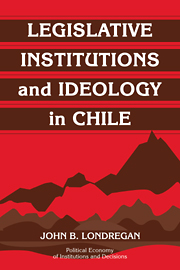Book contents
- Frontmatter
- Contents
- Acknowledgments
- Introduction
- 1 Ideology and Valence
- 2 Accident and Force
- 3 Legislative Institutions in the Constitution of 1980
- 4 Roll-Call Votes and Senate Committees
- 5 The Labor Committee
- 6 The Education Committee
- 7 The Constitution Committee
- 8 Legislative Politics and Chile's Transition Toward Democracy
- Conclusion
- A Estimating Preferences from Voting Records
- Bibliography
- Index
- Titles in the series
8 - Legislative Politics and Chile's Transition Toward Democracy
Published online by Cambridge University Press: 22 October 2009
- Frontmatter
- Contents
- Acknowledgments
- Introduction
- 1 Ideology and Valence
- 2 Accident and Force
- 3 Legislative Institutions in the Constitution of 1980
- 4 Roll-Call Votes and Senate Committees
- 5 The Labor Committee
- 6 The Education Committee
- 7 The Constitution Committee
- 8 Legislative Politics and Chile's Transition Toward Democracy
- Conclusion
- A Estimating Preferences from Voting Records
- Bibliography
- Index
- Titles in the series
Summary
This chapter draws together the evidence about legislators' policy preferences presented in Chapters 5–7 and then applies the model of executive legislative relations from the first two chapters to explain variation in the rate of policy change across issue areas. This analysis reveals that the policy guarantees left in place by the military government are not permanent; the existing institutional framework permits a gradual shift of policy toward the position advocated by the democratically elected president. However, the speed of change ranges from very slow in some policy areas down to glacial in others. In an ironic twist it is the strong presidency written into the Constitution of 1980, presumably in the expectation that Pinochet was the most likely occupant, that operates as the primary means by which policy responds to the electoral majority.
The first section of this chapter uses the committee roll-call votes to address the question of “dimensionality.” Are the observed voting alliances the same across the four issue areas analyzed in depth during the preceding chapters, or is it meaningful to think about there being multiple issue dimensions, with some legislators locating on the left on issues involving income redistribution but on the right on questions of personal morality?
- Type
- Chapter
- Information
- Legislative Institutions and Ideology in Chile , pp. 212 - 241Publisher: Cambridge University PressPrint publication year: 2000



